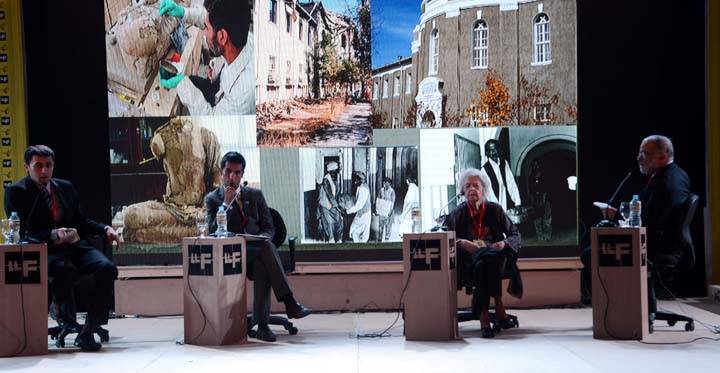This year, the fourth edition of the Lahore Literary Festival (LLF) was held at the Avari Hotel instead of the Alhamra Arts Council. It was a wonderful event where people got the chance to listen to and meet their favourite intellectuals, writers, artists and inspiring literati from around the world. These stars of different fields shared their ideas, knowledge and experiences and enlightened the minds of the audience. Events like these serve the purpose of cultural diplomacy which help people understand others’ points of view; something we could use a lot more of in our part of the world. They also help to explore different horizons in the fields of literature, the arts, culture, politics and economics. Here’s a short roundup of three of the finest sessions I was fortunate enough to attend.
‘Festivity of Soul: The Tradition of Qav’vali
This session related to music focused on the history and the tradition of qav’vali. Veteran poet Zehra Nigah, Dr Arifa Syeda Zehra and writer Dr Hasan Aziz were the speakers and the session was moderated by Qasim Jafri. Tracing the history of qav’vali in the subcontinent, Dr Arifa said that it came here in the eleventh century from Iran. “Qav’vali saved our tradition, which our rulers couldn’t do,” she said. Taking Dr Arifa’s stance one step further, Dr Aziz explained that the tradition of qav’vali is 2000 years old but the present form that we listen to today was introduced by Amir Khusro. He mentioned that the modern generation was aware of qav’vali because of Nusrat Fateh Ali Khan and Coke Studio. “Qav’vali is now considered fusion,” he added. Dr Arifa, in a tongue-in-cheek manner commented on the provincial government’s change in venue and said, “When the qav’vali started, there was neither any NOC nor any passport or the delegate badge required.” She also quipped that Urdu was a stranger`s language, while the mother tongue was English. Zehra Niagh further elaborated on the significance of language. “In Sufism, language had no barriers. Hindus have written for Muslim saints and Sufis, while the Muslims have written about Sikhs,” she said. “The differences people observe these days are created in recent times.” The panellists declared this ancient musical form as a direct connection to faith and spirituality.
‘Life with my Father, George Orwell’
This was a conversation with Richard Blair, an adopted son of Orwell, and the acclaimed novelist and journalist Mohammad Hanif. They discussed the legacy of Orwell and how he was still relevant in the present era. Blair was only four years old when his father passed away in 1950. He reminisced about the time he spent with his father and shared his memories from the trip they took to Burma for fishing. Speaking about his work, he mentioned the difficulties his father had to face to get his work published; particularly Animal Farm- an allegorical and dystopian novel against Stalin. Orwell was against totalitarianism and loathed authoritarian social practices.
Making Museums: Preserving National Heritage in Stressed Societies
Related to history and preservation, this session included the Director of the Afghanistan Centre at Kabul University in Afghanistan, Nancy Dupree, who shared her memories and experiences in Afghanistan with the audience. She came there in 1962 when Afghanistan was a different place. She recollected her memories of war time spanning over decades and described her efforts at preserving her cultural heritage and the restoration of the several historical and archaeological sites including the restoration of the Bamiyan Bhudda. Noor Agha Noori and Abdul Hafiz Latify too shared their thoughts about the impacts of war on society: “We are all helpless and even the UN is doing nothing except giving statements.” Hafiz Latify spoke of his sorrow on strained ties between neighbouring countries affecting cultural preservation. “Had neighbouring countries extended a hand of cooperation, many antiquities could have been saved,” he said. At the end of the session it was emphasised that decaying archaeological sites in Pakistan and Afghanistan must be saved. Nancy Dupree who is also nicknamed the “grandmother of Afghanistan” was given a Lifetime Achievement Award in this session.






